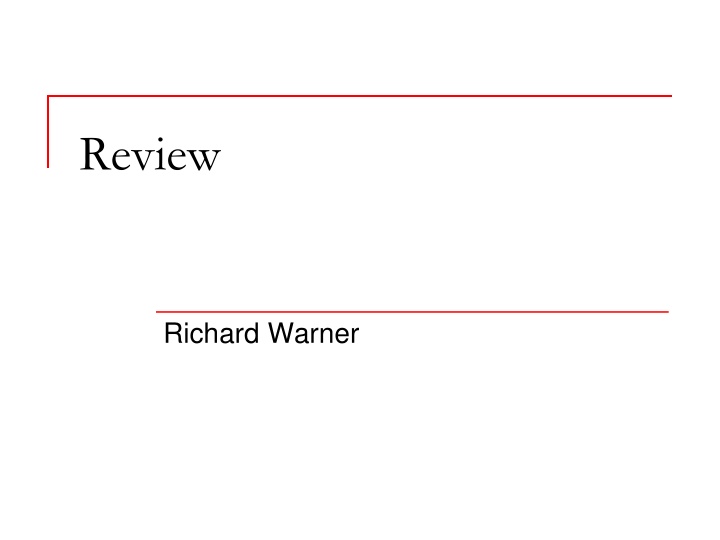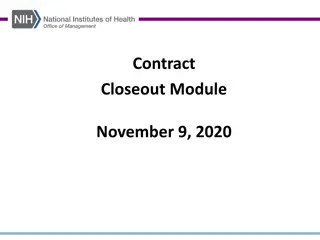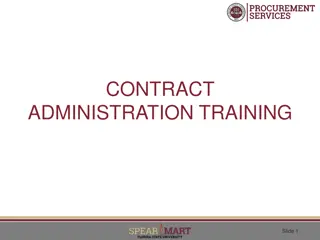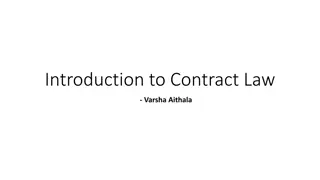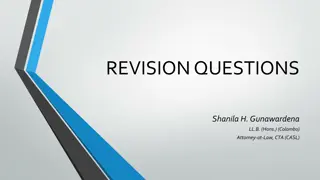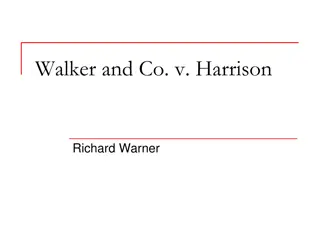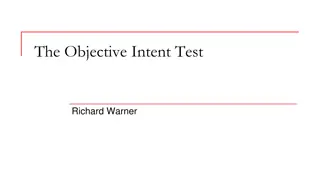Legal Contract Scenarios Analysis
This content provides scenarios involving legal contracts, consideration, interpretation, and contract law principles. It discusses cases such as transportation contracts, beer barrel sales, gift promises, and coin collection disputes, exploring the application of legal doctrines and principles in each situation.
Download Presentation

Please find below an Image/Link to download the presentation.
The content on the website is provided AS IS for your information and personal use only. It may not be sold, licensed, or shared on other websites without obtaining consent from the author.If you encounter any issues during the download, it is possible that the publisher has removed the file from their server.
You are allowed to download the files provided on this website for personal or commercial use, subject to the condition that they are used lawfully. All files are the property of their respective owners.
The content on the website is provided AS IS for your information and personal use only. It may not be sold, licensed, or shared on other websites without obtaining consent from the author.
E N D
Presentation Transcript
Review Richard Warner
Review Ace Trucking contracts with Chickens R Us to transport frozen, eviscerated chickens from Georgia to North Carolina. The standard form contract supplied by Ace contains a cancellation clause giving Ace the right to cancel the contract with 10 days notice. It also contains a clause that says that Chickens will pay for charges Ace incurs for transporting manufactured products across state lines. Neither Ace nor Chickens considers whether a frozen, eviscerated chicken is manufactured product. In an entirely unexpected move, the Interstate Commerce Commission declares that frozen, eviscerated chickens are a manufactured product and imposes charges on Ace Trucking. Which doctrines would you consider? (a) Consideration (b) Interpretation (c) Consideration first, then interpretation. (d) Interpretation first, then consideration.
Victor/Victoria Victor agrees to sell 10 barrels of beer to Victoria at $100 a barrel. As both Victor and Victoria know, the standard practice (and Victor s practice) is to use 31 gallon wooden barrels, and they know as everyone in the trade knows that the barrels hold less than 31 gallons as the get older. No one complains. All accept deliveries of a mix of newer and older barrels. There is a statute that defines a barrel as 31 gallons. Victor delivers 10 barrels. The barrels are a mix of newer and older barrels. Applying the Objective Intent Test, did Victor breach his promise?
Victor/Victoria Victor agrees to sell 10 barrels of beer to Victoria at $100 a barrel. As both Victor and Victoria know, the standard practice (and Victor s practice) is to use 31 gallon wooden barrels, and they know as everyone in the trade knows that the barrels hold less than 31 gallons as the get older. No one complains. All accept deliveries of a mix of newer and older barrels. There is a statute that defines a barrel as 31 gallons. Victor delivers 10 barrels. The barrels are a mix of newer and older barrels. The trade usage is that barrel means barrel in current use. Did Victor breach his promise? a) Yes b) No
Aunt Tillie and Charley Aunt Tilly promises to give some money to her nephew Charlie. Uncle Fred says that the promise will not be legally binding without consideration from Charlie. He says to have Charlie promise not to refuse to accept the money. (a) Charlie has a legal right to refuse the gift, so his promise counts as consideration for Aunt Tilly's promise. (b) Charlie's promise is a sham, an attempt to circumvent consideration doctrine. It is inadequate as consideration. (c) The money will benefit Charlie, and a benefit to the promisee is sufficient for consideration. (d) None of the above.
Oswald v. Allen Oswald pays $50,000 for a Swiss coin collection. What he thinks he is buying what are in fact two distinct Swiss coin collections. Allen thinks she is selling only one of the collections. The contract was for sale of "Swiss coins"--the phrase was ambiguous in the context. Under Restatement 201, there is no contract. (a) Yes (b) No
Sally and Scrooge Sally sees Scrooge's daughter about to be run over by a car. She runs into the street, grabs the girl, and throws her clear of the speeding vehicle. Sally herself however is hit by the car and severely injured. As Sally is lying on the street waiting for the ambulance, Scrooge says, "Don't worry; I'm wealthy; I promise I'll give you $200,000 for saving my daughter's life, so don't worry about money at all."A few days later, while Sally is lying in the hospital, Scrooge, having recovered from the transient feeling of gratitude, sends his lawyer to Sally to explain that Scrooge will not be making the gift of $200,000. Is Scrooge legally bound by the promise? (a) Probably not, because Sally saved Scrooge's daughter before Scrooge made the promise, and past actions cannot be consideration for a promise. (b) Yes, because the injury is a detriment to Sally. (c) No, because the promise is a gift made out of gratitude. The court will not enforce such promises. (d) Maybe, if the court thinks that Scrooge is acknowledging a moral obligation by making the promise; some courts count moral obligations to others for what they have done in the past as sufficient for consideration.
Careless Collectors Expansion City contracts with Careless Collectors to collect its garbage. Collectors agrees to collect the garbage for five years; and Expansion agrees to pay $500,000 a year to Collectors. Expansion City doubles it size in two years after the signing of the contract. At the beginning of the third year of the contract, Careless Collectors refuses to collect the garbage and demands more money. Collectors points out that it now costs it over $500,000 a year to collect the garbage, so they are losing money. When negotiating the original contract, Expansion City had supplied Careless Collectors with growth studies that indicated that Expansion would double its size in two to five years. Collectors did not take these predictions into account when setting the $500,000 a year contract price. With the garbage piling up and constituting a health hazard and with no other company to turn to other than Collectors, Expansion agrees to a new contract with Collectors for $700,000 a year. (a) The contract for $700,000 is enforceable because under UCC 2-209 any contract modification is enforceable without consideration. (b) The contract for $700,000 is enforceable because Careless Collectors encountered difficulties in performance. (c) The contract for $700,000 is unenforceable in light of the pre- existing duty rule. (d) None of the above.
